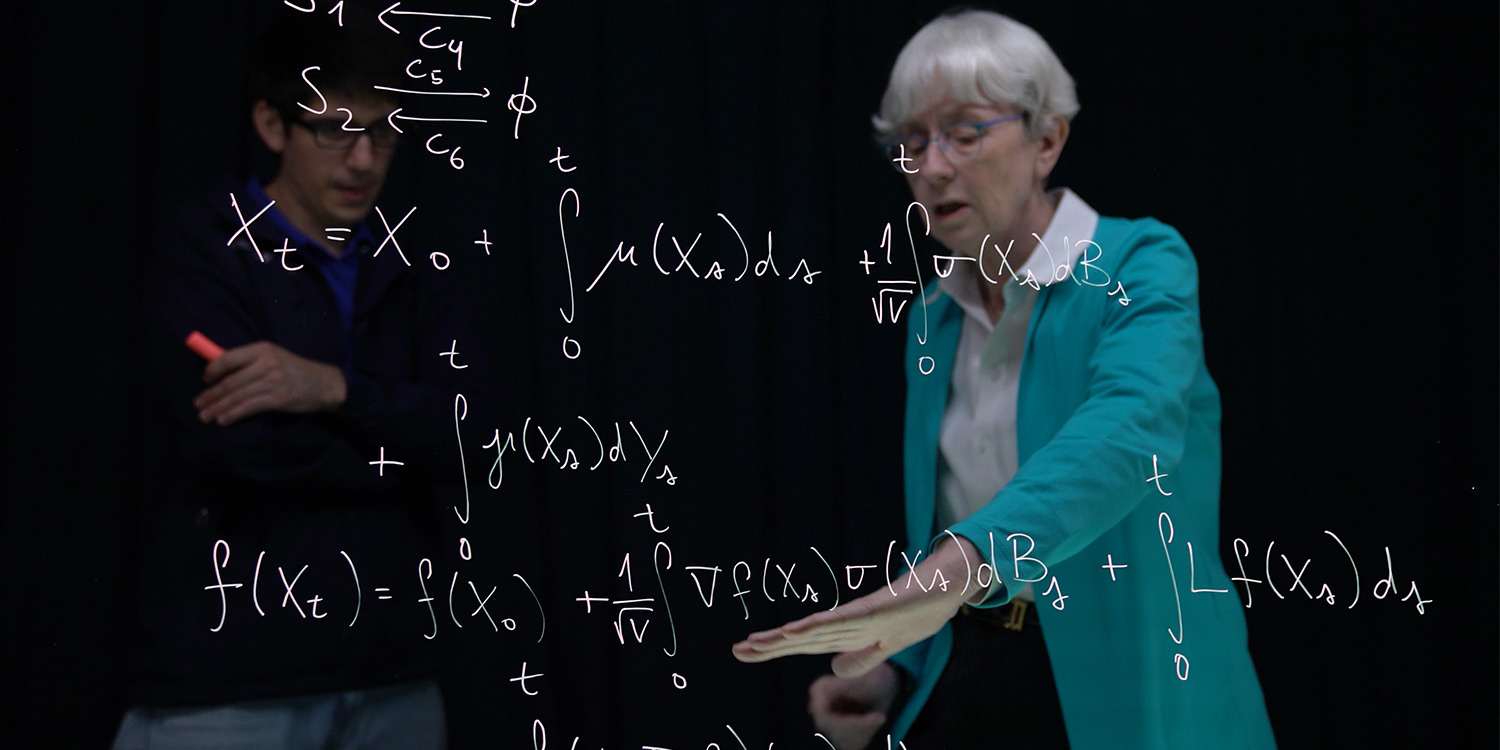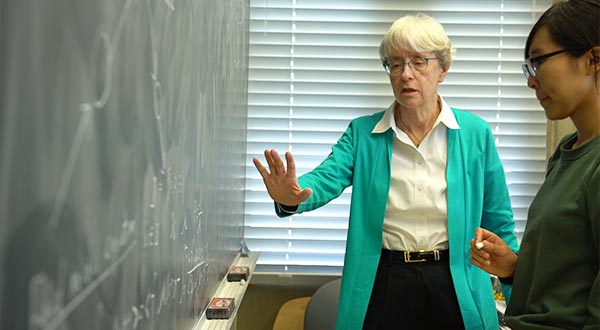Distinguished Math Professor’s Road to Success Takes her Full Circle
Published Date
By:
- Cynthia Dillon
Share This:
Article Content

Ph.D. student Felipe Campos-vergara (left) reviews a stochastic model for chemical reactions with Williams. Image courtesy of UC San Diego Publications
The headaches of heavy traffic may be universal, but University of California San Diego’s Ruth Williams works to ease the pain. The Department of Mathematics professor analyzes traffic congestion within the field of stochastic networks. This area of math describes real-world systems running at near-maximum capacity. It applies to things like the Internet when congested, assembly line glitches, customer service queues and freeways at rush hour. For this work, and for her many contributions to probability theory and collaborative research, Williams has been selected as a Corresponding Member of the Australian Academy of Science. The U.K.’s Professor Richard Ellis joins her as a new academy member.
“Professors Williams and Ellis join the academy as corresponding members, a special category within the fellowship, comprising eminent international scientists with strong ties to Australia who have made outstanding contributions to science,” said Andrew Holmes, president of the Australian Academy of Science.
Williams, who serves on the Scientific Advisory Board of the Australian Research Council Center of Excellence for Mathematical and Statistical Frontiers (ACEMS), was born and grew up in Australia. A member of the governance board of MATRIX, an international research institute that runs programs where world leading mathematical researchers and experts from business and industry collaborate, Williams studied mathematics at the University of Melbourne, earning her Bachelor and Master’s degrees. She then headed to Stanford University for her Ph.D. She is a fellow of St. Hilda’s College at the University of Melbourne, and she received an honorary Doctor of Science degree from La Trobe University. She is known to have helped numerous individuals in their research, while inspiring others with her excellence in the field.

Ph.D. student Yingjia Fu (right) discusses an Internet bandwidth sharing model with Williams. Image courtesy of UC San Diego Publications
“I am deeply touched to receive this honor from my native country, where I received the formative education that started me on my path to becoming a mathematician and where I have many connections still,” said Williams. “Growing up, Australian scientists were a great inspiration to me.”
Williams noted that the Australian Academy of Science holds the induction at its headquarters. “The Shine Dome, that houses the Australian Academy of Science, is an inspiration in itself—futuristic in design and full of engineering challenges ingeniously overcome,” she said. “It will be a thrilling moment for me when I walk across the building’s moat to sign the membership book.”
At UC San Diego, Williams holds the Charles Lee Powell Chair in Mathematics I, as well as other titles, including member of the American National Academy of Sciences, fellow of the American Mathematical Society and winner of the 2017 Award for the Advancement of Women in Operations Research and the Management Sciences. In 2016, she was awarded the John von Neumann Theory Prize for research contributions over the past several decades to the theory and applications of stochastic networks/systems and their heavy traffic approximations.
Mathematics in the Division of Physical Sciences is one of the top 10 most declared majors at UC San Diego. Faculty research produces new results in different areas of the mathematical sciences, including probability and statistics, analysis and optimization, algebra and differential geometry, combinatorics and number theory, and computational mathematics and modeling. UC San Diego math research positively impacts many areas of the natural sciences, engineering, health and social sciences. The Department of Mathematics graduate program ranks among the top 20 in the country according to U.S. News and World Report.
Share This:
You May Also Like
Stay in the Know
Keep up with all the latest from UC San Diego. Subscribe to the newsletter today.



